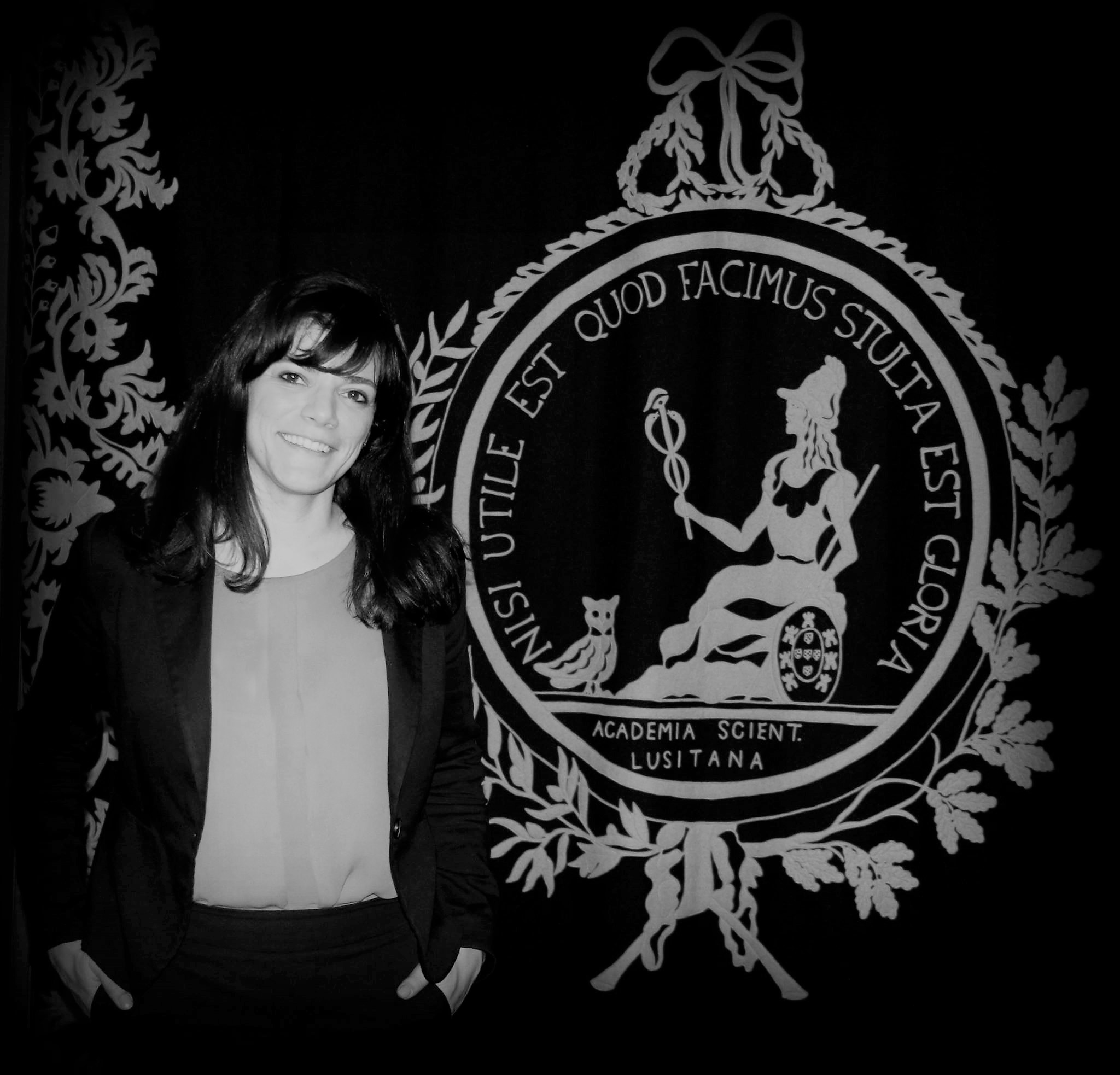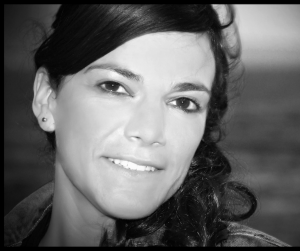“Dictionaries are more than large repositories of information.”
Ana de Castro Salgado is one of the five lucky winners of the first ELEXIS call for travel grants. She is an experienced lexicographer and currently writing her doctoral thesis at FCSH-UNL / CLUNL.
Her mission? To propose guiding criteria for inclusion and description of terms, combining lexicographic and terminological methods.
Curious? Us too! So we asked her to answer a few questions:
© Ana de Castro Salgado, 2018
How did you learn about the ELEXIS travel grants?
The Faculdade de Ciências Sociais e Humanas of the Universidade NOVA de Lisboa (FCSH-UNL), namely Centro de Linguística da Universidade Nova de Lisboa (CLUNL), is a member of ELEXIS, having as collaborators Rute Costa (principal investigator and my PhD’s supervisor) and Christophe Roche.
“The training I had during Summer School led me to think,
that sharing my lexicographic knowledge with other entities would be valuable.”
When I participated in Lisbon’s Summer School in Linguistics – PhD Program (Linguistics – Knowledge, Representation and Use), from July 2 to 6, 2018, promoted by CLUNL, and which was attended by members of ELEXIS (Rute Costa, Christophe Roche and Toma Tasovac), I was informed that the ELEXIS travel grants were open.
Given the main concern of my doctoral thesis, combining lexicographic and terminological methodologies, Rute Costa advised me to compete to receive the travel grant.
Considering my affinity with academic work, I decided that Real Academia Española was a good choice. Also the training I had during the Lisbon Summer School with Toma Tasovac (Belgrade Center for Digital Humanities), «From Print to Screen: The Theory and Practice of Digitizing Dictionaries», led me to think that the possibility of sharing my lexicographic knowledge with other entities would be valuable.
What is your project about?
In my research I want to propose guiding criteria for inclusion, description of terms in general language dictionaries, with the aim of helping lexicographers in this specific task. Combining lexicographic and terminological methods provides an added value for the planning of macro language dictionaries, improving the organization and description of lexicographical articles.
What is your background that brought you up to this point?
I’m a lexicographer with 16 years of experience. I have spent most of the time at a large Portuguese publishing house: Porto Editora.
Now, I’m working at Instituto de Lexicologia e Lexicografia da Língua Portuguesa of Academia das Ciências de Lisboa, and I’m the coordinator of the new Portuguese Academy Dictionary and responsible for the Vocabulary.
I’m a researcher at CLUNL and a PhD student in Terminology at NOVA Lisbon.
“Combining lexicographic and terminological methods provides
an added value for the planning of macro language dictionaries.”
The opportunity to know from inside other lexicographical works, especially to the DLE, is of most interest to us.
Confronting and comparing the structures of two dictionaries, RAE-ACL, is an added value in decision making.
Where does your interest in languages/lexicography come from and what keeps you motivated?
Dictionaries are more than large repositories of information.
They constitute a valuable heritage for society as a monument of national and cultural prestige and must necessarily take advantage of the technologies that have guided the lexical and terminological descriptions to different levels.
In that sense, it would be very important to exchange views on the work carried out by the two academies in order to contribute to the promotion of a culture of free access in lexicography.
With this visit, I intend to discuss different approaches, to exchange impressions on lexicographical works, to get to know their writing systems, and to share knowledge.
Find out more about ELEXIS visiting grants and former winning projects:
| Profile: Ana de Castro Salgado | ||
| Travel Grant | Call 1 | |
| Period of stay | 12.11. – 30.11.2018 | |
| Project title | Introduction to the macro and micro structure of RAE: Diccionario de la lengua española for the work on the new Dicionário da Língua Portuguesa (DLP) | |
| Home institution |
Faculdade de Ciências Sociais e Humanas da Universidade Nova de Lisboa/Centro de Linguística da Universidade NOVA de Lisboa (FCSH-UNL, Portugal) |
#elexis_pt |
| Hosting institution |
Real Academia Española (RAE, Spain) |
#elexis_es |
PORTUGUESE LEXICOGRAPHER VISITING REAL ACADEMIA ESPAÑOLA
«[lexicógrafo] un ser inficionado por un vírus
que le mueve a ejercer como tal las 24 horas del día»
Pedro Álvarez de Miranda, director of the latest edition
of the Spanish academic dictionary
© Ana de Castro Salgado, 2018
[Update] In the meantime Ana de Castro Salgado has started her researching visit at Real Academia Española (RAE).
ELEXIS asked her about her impressions and outcomes and to tell us, in which way she has gathered insights and experience so far.
It becomes apparent that winning an ELEXIS travel grant enables a different perspective on the possibilities of undertaking research and enriches the individual point of view:
I’m on the way to the last week in Madrid, knowing the lexicographical work developed at the Real Academia Española (RAE), namely in the Centro de Estudios of RAE, its infrastructures and computational and linguistic tools. Being a researcher at NOVA CLUNL and a PHD student in Terminology at NOVA Lisbon, I am enjoying the ELEXIS research visit.
“Lexicographers will not die; we just have to change the perspective and potentiate all the content we create daily.”
I’m in the Instituto de Lexicografía (ILex), with the team of lexicographers, whose main function is to prepare the lexicographic works, especially the Diccionario de lengua española (DLE), working on a computer platform in JAVA and XML, the Entorno de Redacción Integrado (ERI), which will be replaced with a new centralized and standardized infrastructure that will house all academic lexicographical work.
The next edition of the DLE will be digital and the new structure is already prepared. The Spanish and the Portuguese Academies are using the standard format TEI (Text Encoding Initiative), which will make it possible to exchange data in the future.
It has been an excellent opportunity to talk and share ideas with other lexicographers, proving that in fact the most problematic lexicographical issues are universal and our concerns are the same, whether it is a dictionary for Spanish or for Portuguese.
This highlights the importance of projects such as ELEXIS.
“Lexicographers must make an effort to break with the past and embrace the era of digital revolution in order to learn how to benefit from it.”
It has been very advantageous to understand how the work of updating the Diccionario de lengua española (DLE) is processed, since it is a more complex process than doing the same for the Portuguese equivalent: Just like in Portugal, the RAE has academic plenaries and different committees to approve the changes. On top of that, it also interacts with the Asociación de Academias de la Lengua Española (ASALE), distributed throughout the Hispanic world.
I also had the opportunity to get to know the content of the master’s degree in Lexicografía Hispánica (which results from a protocol between the University of León and RAE) and how the lexicographical work has been integrated into the courses.
I have also explored other projects developed by RAE, such as CORPES (Corpus del Español del siglo XXI), a continuously growing corpus and Nuevo Diccionario Histórico (CDH), which tries to elaborate a biography of each vocabulary and its evolution in time, using advanced technology.
I would like to highlight a new platform of resources and linguistic services of RAE, accessible through a subscription: ENCLAVE.
Hence, I emphasize the DLE23 interface, with onomasiological, semasiological and paradigmatic information.
ASPECTS FOR FURTHER REFLECTION:
The criteria for the usage labels of the DLE are different from the ones used for the Portuguese dictionary of the Academia das Ciências de Lisboa.
I think it would be advantageous for us lexicographers, linguists, terminologists, engineers, and computer scientists, to unify this specific information – for example using DCR in general language dictionaries.
The last and for me most important point is that we, lexicographers who worked for many years on printed dictionaries, must make an effort to break with the past and embrace the era of digital revolution in order to learn how to benefit from it. We need to broaden the scope of dictionaries from a product that fulfills a single purpose. Through the usage of lexical organized databases we are able to extract larger and more diverse information and build new products that can satisfy multiple users needs. This is our biggest challenge. Lexicographers will not die; we just have to change the perspective and potentiate all the content we create daily.
A reference to my ELEXIS travel grant project can be found here.
Selected Social Media Clippings
Ana Salgado @saldalingua is the first out of five ELEXIS #travelgrant winners, to start her research visit this week! with @RAEinforma, she’s analyzing the Diccionario de la lengua española for a new Dicionário da Língua Portuguesa #elexis_eu
— ELEXIS (@elexis_eu) 13 November 2018





 Ivana Filipović Petrović
Ivana Filipović Petrović Henrik Køhler Simonsen
Henrik Køhler Simonsen